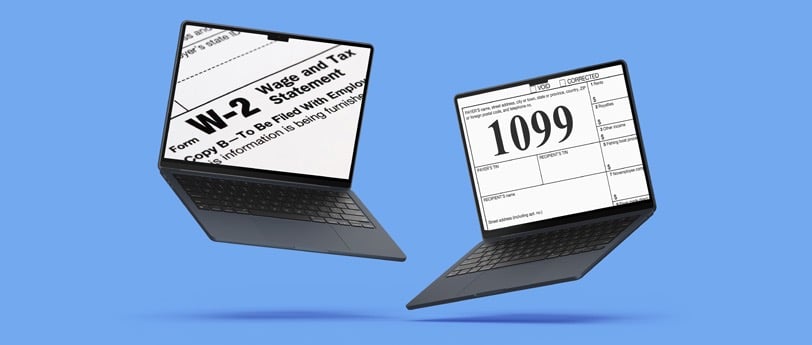📞 (858) 308-1100
✉️ contact@veslav.com
1099 vs W-2 – What’s the Difference in 2025?
8/12/20252 min read


As a small business owner, understanding the difference between a 1099 contractor and a W-2 employee is essential for compliance, tax reporting, and budgeting. Misclassification can lead to serious penalties – so in 2025, it’s more important than ever to know where the line is drawn.
Let’s break it down.
1099 vs W-2: What Do These Forms Mean?
1099-NEC: Used to report non-employee compensation – payments made to independent contractors.
W-2: Used to report employee wages, taxes withheld, and benefits.
The form you issue isn’t just a tax document – it reflects how the worker is treated under the law.
✅ W-2 Employees
W-2 workers are your employees. You control what, how, and when they do their work. You’re responsible for:
Withholding federal and state income taxes
Paying employer portions of Social Security and Medicare (FICA)
Unemployment insurance and workers' comp (where required)
Providing a W-2 by January 31, 2026
📌 Use W-2 if:
You supervise their schedule
You provide the tools/equipment
The work is ongoing or integral to your business
✅ 1099 Contractors
1099 contractors are self-employed. They control how and when the work gets done, and they:
Handle their own taxes (no withholdings from you)
Pay self-employment tax (Social Security + Medicare)
Invoice you for services
Receive a 1099-NEC if paid $600+ during the year
📌 Use 1099 if:
The contractor sets their own hours
They use their own tools
You’re contracting a project or temporary service
How to Decide?
Follow the Control Test. The IRS focuses on three key areas of control:
Behavioral – Do you control how the work is done?
Financial – Who controls the business aspects (tools, expenses, profit/loss)?
Relationship – Is there a written contract? Are benefits provided?
If you're unsure, the safer route is to treat the worker as an employee – or request a determination from the IRS (Form SS-8).
🆕 What’s New or Important in 2025?
E-filing mandate expanded:
If your business files 10+ information returns, you're now required to file 1099s and W-2s electronically via the IRS and SSA portals.Worker classification enforcement:
The Department of Labor is increasing audits. Be ready to prove why a contractor isn’t an employee.State rules vary:
Some states (like California) follow stricter ABC tests under laws like AB5. Always review local guidance.
How We Can Help
Our bookkeeping team helps small business owners:
Track contractor vs. employee payments accurately in QuickBooks
Prepare 1099s and reconcile records at year-end
Clean up payroll accounts to ensure W-2s are complete
Stay compliant with changing IRS and state rules
💬 Need help organizing your 2025 books before tax season? Let’s talk.
Veslav Consulting
Simplifying Your Finances,
Empowering Your Growth
Contact Us
Join our newsletter list
858-308-1100
© 2025 Veslav Consulting. All rights reserved.
